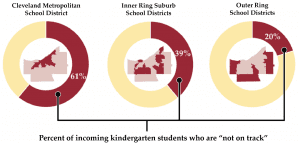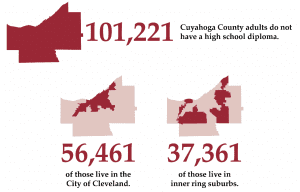This year was a great year of growth for The Literacy Cooperative! We relocated smoothly to offices within the Hanna Building, promoted Joan Spoerl from a part-time coordinator to full-time Director of Imagination Library, and hired Emma Keating as our full-time Digital Communications Associate.
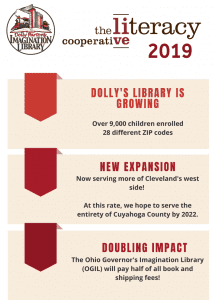
Imagination Library
This year marks some exciting times for Imagination Library! The State of Ohio approved $5 million to create the Ohio Governor’s Imagination Library Program (OGIL) to support the statewide expansion of the Imagination Library. The funds will be used to pay for one-half of the costs of books and mailing of the books. First Lady Fran DeWine has been leading this effort.
As of today, we are serving over 9,000 children in 28 different ZIP codes, most recently adding ZIPs 44121, 44124, and 44143.
2Gen Community
TLC and the 2Gen Committee published the 2Gen Call to Action and gathered direct service providers, educators and administrators for a 2Gen Summit, where the plan was presented. A total of 78 people across 47 organizations participated. TLC worked with committee partners to foster 2Gen partnerships that resulted in the funding of two additional 2Gen pilots in Cuyahoga County. There are currently four 2Gen pilots connected to the committee and TLC will be working with them to track progress and successes.
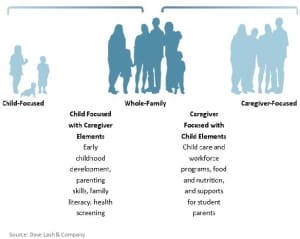
XPRIZE Communities Competition
Between April and August, TLC led a team of local organizations and entered the $1 million Adult Literacy XPRIZE Communities Competition, a national competition that challenges organizations, communities and individuals to recruit adults with low literacy skills to download and use effective, convenient and private learning apps. Team LitFitNEO, consisting of partners in Cuyahoga and Summit counties, was among 46 competitors across the U.S.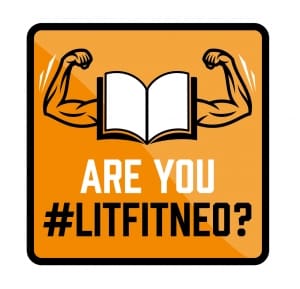
The team spread the message to all adults to download and use the apps to advance literacy and to give our community the chance to win the competition and bring much-needed resources to advance adult literacy services.
On April 1, 2019, XPRIZE recognized the team for their innovative, feasible and scalable plan and awarded us one of 24 Milestone Awards, granted for best proposals.
Professional Excellence
TLC uses its professional development platform to share promising practices with the community. So far this year, we have provided 18 workshops, one national speaker engagement, our 2Gen Literacy Summit, our Teacher Academy and three learning communities to more than 700 attendees representing more than 100 organizations.
Career Pathways
TLC continued its partnership with University Settlement for the operation of NEO Skill Corps. In 2019, an evaluation of NEO Skill Corps was published for services provided September 2015 through August 2018. The conclusion indicated the program was successful in reaching its performance goals. The program supported 3,867 participants at 12 sites across the city of Cleveland. As a result of the program, 79% of participants achieved their intended goal of finding a job, enrolling in training or tutoring, or completing work readiness programs.
Co-chairing the Slavic Village P-16 Employment Committee with Towards Employment, we led a manufacturing career pathway pilot in response to employers in and around Slavic Village needing entry and mid-level employees. Our first two cohorts resulted in 11 of 15 successfully obtaining the national certification and eight out of 11 placed at an average wage of $14.00 per hour.
Contextualized Curriculum
One of the key successes highlighted from the Slavic Village manufacturing certification training program pilot was the use of the contextualized curriculum and the tutoring offered to participants to prepare them for the WorkKeys and the Certified Production Technician (CPT) assessments. The instructor indicated that participants passed their assessments due to this combination of assistance.
TLC hosted professional development sessions to provide instruction on the use of the contextualized curriculum. TLC’s inventory of contextualized curriculum now includes 40 hours of math and reading exercises related to IT/digital literacy and healthcare, and more than 150 hours of math, reading, science and social studies lessons related to construction and manufacturing. There are 150 instructors from Cuyahoga, other Ohio counties and other states with access to the curriculum.
TLC is actively working on refreshing the contextualized curriculum and adding curriculum for the hospitality sector.
Ohio Workforce Coalition and SkillSpan
The National Skills Coalition has selected the Ohio Workforce Coalition to join SkillSPAN, a nationwide network of non-partisan coalitions focused on advancing state policies that expand economic opportunities for workers and their families while boosting local businesses’ capacity. The Ohio Workforce Coalition joins the original 10 founding states and will receive a $25,000 grant to advance work throughout 2020. Read the press release.
TLC looks forward to its role as a fiscal agent on behalf of the Ohio Workforce Coalition. With this partnership and involvement, TLC will be able to further establish itself as a leading resource and advocate for literacy education inclusion in Greater Cleveland and beyond.
The Ohio Workforce Coalition brings three major goals to SkillSPAN, including building the skills of adult workers, working to meet the skill needs of employers, and strengthening the entire workforce system. Through this partnership, the Coalition will be better suited to accomplish its goals and build educational and career pathways for all Ohioans.
CLE-BEE (click here for the highlight reel)
TLC hosted its fourth annual Corporate Spelling Bee on Sept. 12, 2019, with a total of 27 teams of three which competed in four “swarms” – finance, community, legal and corporate. TLC received press coverage from Freshwater CLE and WKYC. This year’s final four were Benesch Law, Medical Mutual, ideastream and Tri-C, with Benesch Law taking home the championship.
Reach Out and Read
September marked the end of a 3-year Bruening Foundation grant that funded a full-time Literacy Cooperative staff member to support Reach Out and Read. Lynn Foran is now the executive director of Reach Out and Read Greater Cleveland and will continue serving the community from a new location at The Cleveland Public Library. Read our story here. 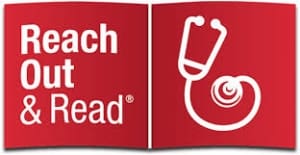
During her tenure here, Foran grew Reach Out and Read Greater Cleveland from 23 health system sites to 33 and facilitated the distribution of 86,000 new books and doctor-parent conversations. Children served by Reach Out and Read score three to six months ahead of others on their vocabulary tests because they are regularly read aloud to. Lynn also contributed to the launch and growth of Imagination Library in Cuyahoga County.
Speaking Engagements
COABE (Coalition on Adult Basic Education) – TLC presented at the annual conference in New Orleans. The panel included the CEO of Academy of Hope Adult Public Charter School, the Research Director for Jobs for the Future and the Senior Policy Analyst from the Center for Law and Social Policy (CLASP). The topic focused on urban communities and how to help adults develop basic skills, family-sustaining employment to build stronger communities. Laureen Atkins discussed the development and use of the contextualized curriculum available through TLC.
Bob Paponetti made multiple media appearances on WKYC to promote the CLE-BEE, discuss Reach Out and Read, and make the case for advanced literacy. He made an appearance on WTAM to promote the CLE-BEE and was featured on their “CEOs You Should Know” list. Bob also co-presented at the Civic Leadership Institute’s Education Day with CMSD Superintendent Eric Gordon. Joan Spoerl was on Sound of Ideas, speaking about how to raise your children to be readers. She talked with a bestselling author from The New York Times about the importance of engaging children in reading from a young age. Laureen Atkins appeared on WKYC to promote the XPRIZE competition.
You can view or listen to our speaking engagements here.
Advocacy/Awareness
TLC staff are members of several Say Yes to Education committees including, Kindergarten Readiness, Family Stability, and Post-Secondary Advancement. TLC staff continues to participate on the Ohio Workforce Coalition, the Open Door Collective, and the NEO Workforce Coalition to develop a coordinated agenda for advocacy and awareness. TLC also serves on Cleveland/Cuyahoga County Workforce Board’s Strategic Functions Committee.
Through the Open Door Collective TLC assisted in the publishing of several Can-Do Guides that provide ways for organizations and leaders to participate in strengthening basic skills in the workforce. Our work with the Ohio Workforce Coalition led to the SkillSPAN partnership that is highlighted on page three.
TLC hosted a Read Across America Day luncheon in March 2019 featuring Dr. Perri Klass, National Medical Director of Reach Out and Read (ROR). More than 170 attendees learned about her work at ROR and how she has trained thousands of medical providers in the ROR strategies of early literacy promotion.
We published our literacy dashboard, developed by staff and our Research and Evaluation Committee. The dashboard details the state of literacy in Cuyahoga County. We used this data to update our policy agenda for stronger advocacy in early literacy, two-generational practices/ parent engagement, and adult education/career pathways.
We continued to increase our presence on social media, adding a Facebook page for the Imagination Library Greater Cleveland with a special parent group for Imagination Library families.
———————————-
For more information on our programs, follow us on social media – @literacycoop on all platforms.
